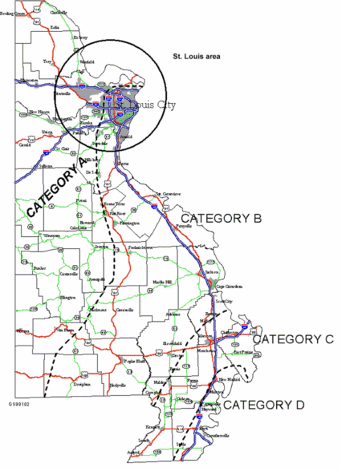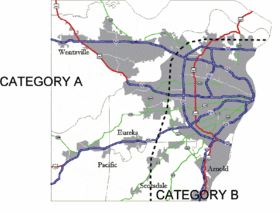Category:756 Seismic Design: Difference between revisions
m remove "Key Points" box from the article |
m Wording clarification, add Bridge Seismic Design Process Flowchart, and remove potentially confusing figure with example design features. |
||
| Line 1: | Line 1: | ||
All new bridges on the state system include | All new bridges on the state system shall include some level of seismic design and/or detailing to resist earthquakes based upon an expected seismic event for a given return period. For example, in Seismic Performance Categories B, C and D, both design and detailing work is needed because of the increased probability of damaging earthquakes. | ||
{| style="margin: 1em auto 1em auto" align="left" | {| style="margin: 1em auto 1em auto" align="left" | ||
|- | |- | ||
| Line 5: | Line 5: | ||
|} | |} | ||
{|style="padding: 0.3em; margin-left:15px; border:1px solid #a9a9a9; text-align:center; font-size: 95%; background:#f5f5f5" width="160px" align="right" | |||
|- | |||
|[[Media:756 Visio-SeismicRetrofitFlow LFD.pdf|Bridge Seismic Design Process Flowchart]] | |||
|} | |||
| |||
| |||
When existing bridges in SPC B, C and D are identified as needing repairs or maintenance, a decision on whether to include seismic retrofitting in the scope of the project should be made based on the location of the bridge, the extent of the rehabilitation work and the expected life of the bridge after the work. For example, if the bridge needs painting or deck patching, no retrofitting is recommended. However, redecking or widening the bridge indicates that MoDOT is planning to keep the bridge in the state system with an expected life of at least 30 more years. In these instances, the project core team should consider cost effective methods of retrofitting the existing bridge. | |||
Revision as of 11:53, 23 March 2009
All new bridges on the state system shall include some level of seismic design and/or detailing to resist earthquakes based upon an expected seismic event for a given return period. For example, in Seismic Performance Categories B, C and D, both design and detailing work is needed because of the increased probability of damaging earthquakes.
 |

|
| Bridge Seismic Design Process Flowchart |
When existing bridges in SPC B, C and D are identified as needing repairs or maintenance, a decision on whether to include seismic retrofitting in the scope of the project should be made based on the location of the bridge, the extent of the rehabilitation work and the expected life of the bridge after the work. For example, if the bridge needs painting or deck patching, no retrofitting is recommended. However, redecking or widening the bridge indicates that MoDOT is planning to keep the bridge in the state system with an expected life of at least 30 more years. In these instances, the project core team should consider cost effective methods of retrofitting the existing bridge.